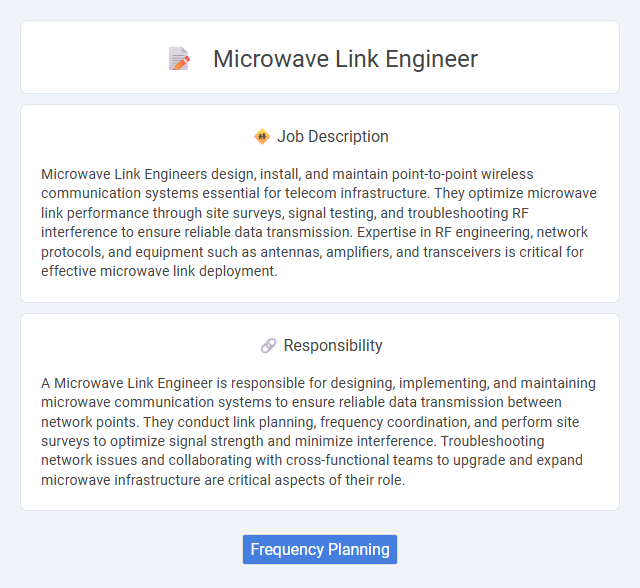
Microwave Link Engineers design, install, and maintain point-to-point wireless communication systems essential for telecom infrastructure. They optimize microwave link performance through site surveys, signal testing, and troubleshooting RF interference to ensure reliable data transmission. Expertise in RF engineering, network protocols, and equipment such as antennas, amplifiers, and transceivers is critical for effective microwave link deployment.
Microwave Link Engineer roles may appeal to individuals comfortable working with high-precision technology and problem-solving in dynamic environments. Candidates with strong analytical skills and an aptitude for technical troubleshooting probably find this job suitable. Those who prefer routine or low-technical tasks might face challenges adapting to the demands of this position.
Qualification
Microwave Link Engineer roles require expertise in RF engineering, microwave communication systems, and network design, typically necessitating a bachelor's degree in telecommunications, electronics, or related fields. Proficiency in industry-standard tools like spectrum analyzers and network planning software, along with certifications such as CCNA or relevant vendor-specific credentials, enhances job readiness. Strong analytical skills, field experience in installation and troubleshooting, and knowledge of microwave link protocols and safety standards are critical qualifications for success.
Responsibility
A Microwave Link Engineer is responsible for designing, implementing, and maintaining microwave communication systems to ensure reliable data transmission between network points. They conduct link planning, frequency coordination, and perform site surveys to optimize signal strength and minimize interference. Troubleshooting network issues and collaborating with cross-functional teams to upgrade and expand microwave infrastructure are critical aspects of their role.
Benefit
A Microwave Link Engineer likely benefits from high demand in telecommunications and network infrastructure projects, offering strong job stability. The role probably provides opportunities for skill development in advanced RF technologies and system optimization. Competitive salaries and potential for fieldwork may also enhance job satisfaction and career growth prospects.
Challenge
Microwave Link Engineer roles likely involve solving complex signal interference and network optimization challenges in varying topographies and weather conditions. It is probable that engineers must frequently troubleshoot equipment malfunctions and ensure reliable microwave communication links under time-sensitive circumstances. Managing spectrum allocation and adapting to emerging wireless technologies could also present ongoing technical hurdles.
Career Advancement
Microwave Link Engineers specializing in wireless communication systems experience rapid career growth due to increasing demand for high-capacity data transmission across telecom networks. Expertise in designing, deploying, and troubleshooting microwave links positions professionals for leadership roles like Network Design Manager or RF Planning Engineer. Continuous skill upgrading in emerging technologies such as 5G and millimeter-wave frequencies significantly amplifies career advancement opportunities within telecommunications and IT infrastructure sectors.
Key Terms
Frequency Planning
Microwave Link Engineers specializing in Frequency Planning optimize spectrum allocation to ensure interference-free communication across microwave networks. They analyze frequency bands, evaluate propagation conditions, and coordinate with regulatory bodies to maintain compliance and maximize network performance. Expertise in spectrum management tools and radio frequency (RF) principles is essential for designing efficient, high-capacity microwave link systems.
 kuljobs.com
kuljobs.com